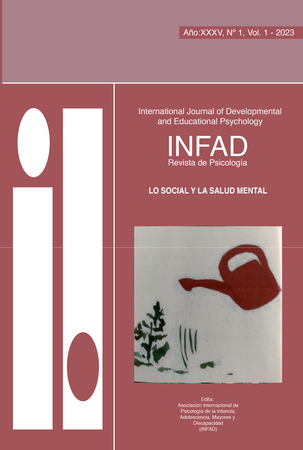Perfeccionismo y uso de internet
Contenido principal del artículo
Resumen
Las personas que tienen propensión a fijar altas expectativas de lo que se debe hacer, excesiva evaluación crítica y preocupación ante incurrir en errores, es lo que se determina como perfeccionismo. Si a ello se le añade la obligación de dominio en las competencias digitales durante el periodo de los estudios superiores, los estudiantes universitarios podrán mostrar mayores preocupaciones, demandas, esfuerzos y pensamientos automáticos perfeccionistas en función del uso diario o esporádico de internet, pues el afán de querer hacerlo todo bien puede generar la frustración personal e inactividad. Esta investigación fue diseñada para identificar las diferencias estadísticamente significativas y la probabilidad de presentar altas puntuaciones en pensamientos automáticos en función del uso de internet. La muestra reclutada fue de 3.060 participantes universitarios de edades comprendidas entre los 19 y 24 años. Se analizaron las competencias digitales mediante el Test Ikanos y los pensamientos automáticos perfeccionistas a través del Perfeccionistic Cognitions Inventory (PCI). El análisis estadístico utilizado fue el análisis de varianza (ANOVA) y la regresión logística por pasos adelante mediante el estadístico de Wald, revelando valores de la Odd Ratio (OR) de .96. En conclusión, los hallazgos arrojaron diferencias estadísticamente significativas en las variables Demandas Perfeccionistas, Esfuerzos Perfeccionistas y la puntuación total en Pensamientos automáticos perfeccionistas según la frecuencia del uso de internet.
Detalles del artículo
Sección

Esta obra está bajo una licencia internacional Creative Commons Atribución-NoComercial-SinDerivadas 4.0.
Aquellos autores/as que tengan publicaciones con esta revista, aceptan los términos siguientes:
- Los autores/as conservarán sus derechos de autor y garantizarán a la revista el derecho de primera publicación de su obra, el cuál estará simultáneamente sujeto a la Licencia de reconocimiento de Creative Commons que permite a terceros copiar y redistribuir el material en cualquier medio o formato bajo los siguientes términos: —se debe dar crédito de manera adecuada, brindar un enlace a la licencia, e indicar si se han realizado cambios. Puede hacerlo en cualquier forma razonable, pero no de forma tal que sugiera que usted o su uso tienen el apoyo de la licenciante (Atribución); — no se puede hacer uso del material con propósitos comerciales (No Comercial); — si se remezcla, transforma o crea a partir del material, no podrá distribuirse el material modificado (Sin Derivadas).
- Los autores/as podrán adoptar otros acuerdos de licencia no exclusiva de distribución de la versión de la obra publicada (p. ej.: depositarla en un archivo telemático institucional o publicarla en un volumen monográfico) siempre que se indique la publicación inicial en esta revista.
- Se permite y recomienda a los autores/as difundir su obra a través de Internet (p. ej.: en archivos telemáticos institucionales o en su página web) antes y durante el proceso de envío, lo cual puede producir intercambios interesantes y aumentar las citas de la obra publicada. (Véase El efecto del acceso abierto).

Este obra está bajo una licencia de Creative Commons Reconocimiento-NoComercial-SinObraDerivada 4.0 Internacional.
Cómo citar
Referencias
Adiction.com. (2014). Investigación de adicciones, causas, adicción a Internet. Obtenido de https://www.addiction.com/blogs/internet-addiction-linked-to-perfectionism/.
Ala-Mutka, K. (2011). Mapping digital competence: Towards a conceptual understanding (and others, Ed.). Luxemburgo: LRC-IPTS European Commission.
Calvani, A., Cartelli, A., Fini, A. y Ranieri, M. (2008). Models and Instruments for Assessing Digital Competence at School. Journal of e-Learning and Knowledge Society, 4(3), 183 - 193. doi:10.20368 / 1971-8829 / 288
Diario Oficial de la Unión Europea. (30 de diciembre de 2006). EUR- Lex. Obtenido de Diario Oficial de la Unión Europea: https://eur-lex.europa.eu/legal-content/ES/TXT/PDF/?uri=CELEX:32006H0962&from=ES
Frost, R., Marten, P., Lahart, C. y Rosenblate, R. (1990). The dimensions of perfectionism. CognitiveTherapy and Research, 449-468. doi:10.1007/BF01172967
Gisbert Cervera, M., Espuny Vidal, C. y González Martínez, J. (2011). INCOTIC. Una herramienta para la @utoevaluación diagnóstica de la competencia digital en la Universidad. Profesorado, 15(1), 75 - 90.
Gisbert, M. y Esteve, F. (2011). Digital learners: La competencia digital de los estudiantes universitarios. La Cuestión Universitaria, 48-59.
Grzegorek, J., Slaney, R., Franze, S. y Rice, K. (2004). Self-criticism, dependency, self-esteem, and grade point average satisfaction among clusters of perfectionists and non perfectionists. Journal of Counseling Psychology, pp. 192-200. doi:10.1037 / 0022-0167.51.2.192
Lehmann, I. y Konstam, V. (2011). Growing Up Perfect: Perfectionism, Problematic Internet Useand Career Indecision in Emerging Adults. Journal of counseling and development: JCD. doi:10.1002 / j.1556-6678.2011.tb00073.x
Lo, A. y Abbott, M. (2013). Review of the theoretical, empirical, and clinical status of adaptive and maladaptive perfectionism. Behaviour Change, 30, 96–116. doi:10.1017 / bec.2013.9
López López, M. L. (2022). Competencias digitales y su relación con variables psicoeducativas. Tesis doctoral. Universidad de Alicante.
Monasterio, K. D. C. B., Castillo, L. J., Reyes, M. C. R., Alcedo, J. M. G. y Torrellas, A. I. L. (2014). Relación entre perfeccionismo multidimensional y dependencia al ejercicio en población masculina. Revista Iberoamericana de psicología, 7(2), 77-84.
Oros, L. (2005). Implicaciones del perfeccionismo infantil sobre el bienestar psicológico: orientaciones para el diagnóstico y la práctica clínica. Anales de Psicología, 21(2), 294-303. Obtenido de http://revistas.um.es/analesps/article/view/26951.
Ozbilir, T., Day, A. y Catano, V. (2015). Perfectionism at work: An investigation of adaptive and maladaptive perfectionism in the workplace among Canadian and Turkish employees. Applied Psychology. An International Review, 64(1), 252–280. doi:10.1111 / apps.12032.
RAE. (2019). Diccionario de la Real Academia Española. Obtenido de https://dle.rae.es/?id=SaWJOKd.
Rice, K. y Ashby, J. (2007). An efficient method for classifying perfectionists. Journal of Counseling Psychology, pp. 72-85. doi:10.1037 / 0022-0167.54.1.72.
Rice, K., Ashby, J. y Slaney, R. (1998). Self-esteen as a mediator between perfectionism and depression. A structural equations analysis. Journal of Counseling Psychology, 45(3), 304-314. doi:10.1037/0022-0167.45.3.304.”
Rice, K. y Slaney, R. (2002). Clusters of Perfectionistic: Two Studies of Emotional Adjustment and Academic Achievement. Measurement & Evaluation in Counseling & Development, 35-48. doi:10.1080 /07481756.2002.12069046.
Slaney, R., Rice, K., Mobley, M., Trippi, J. y Ashby, J. (2001). The revised almost perfect scale. Measurement and Evaluation in Counseling and Development, 34, 130–145. doi:10.1080 / 07481756.2002.12069030
Wang, K., Slaney, R. y Rice, K. (2007). Perfectionism in Chinese university students from Taiwan:A study of psychological well-being and achievement motivation. Personality and Individual Differences, págs. 1279-1290. doi:10.1016 / j.paid.2006.10.006

